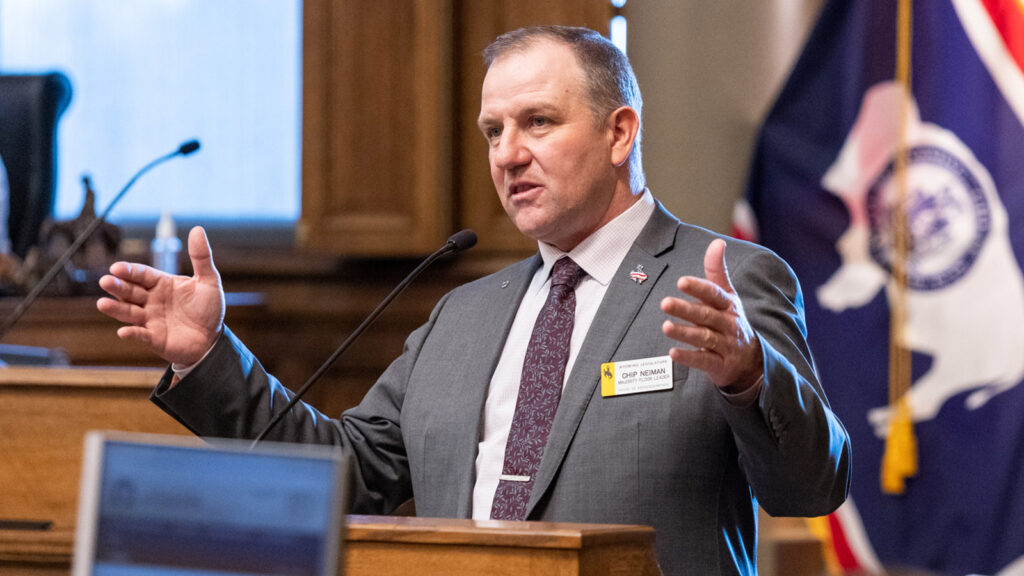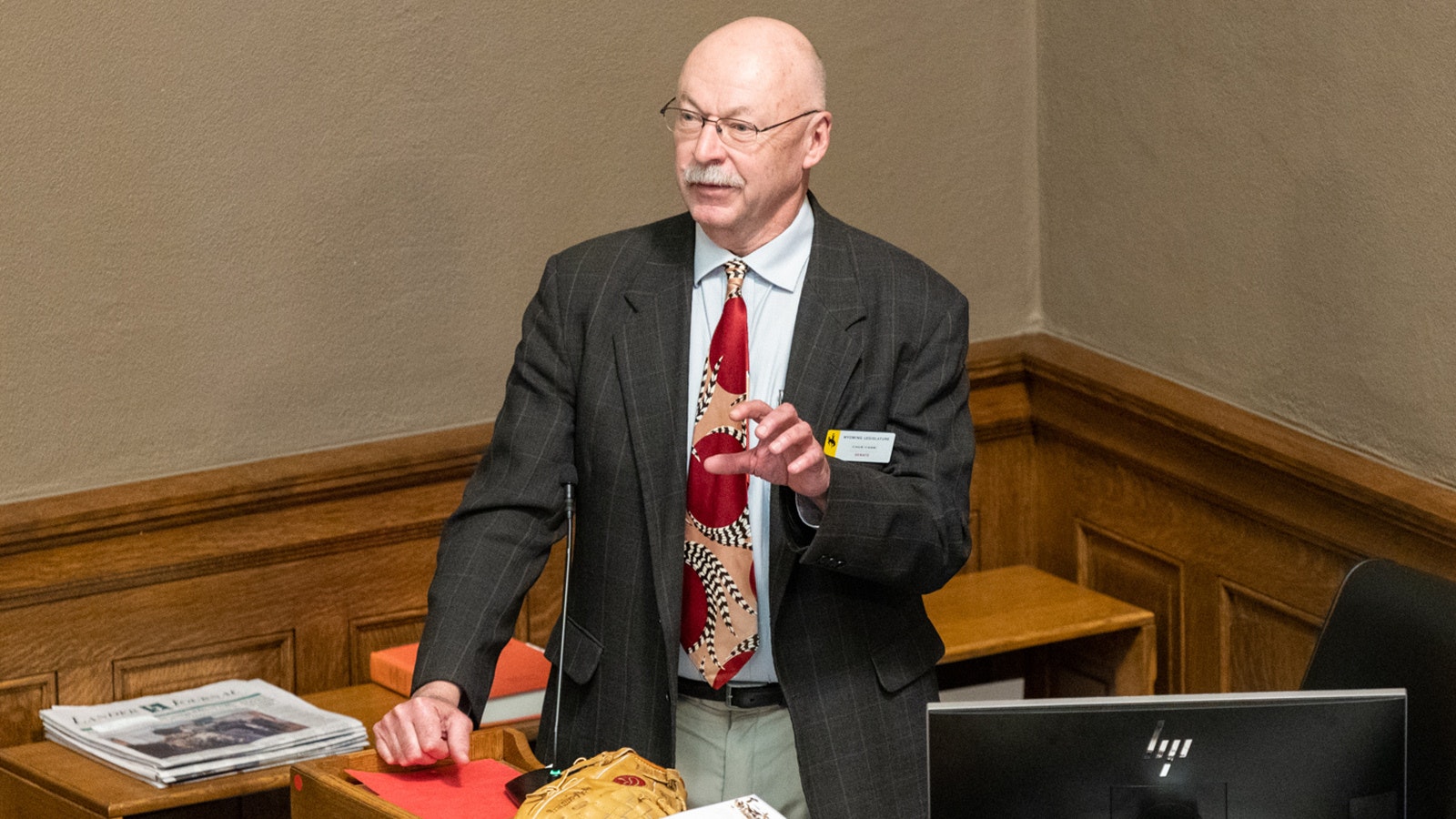Another of numerous attempts in recent years for Wyoming to sign on to expanding Medicaid in the state has failed.
An attempt by Sen. Cale Case, R-Lander, to include Medicaid expansion in the state’s supplemental budget was rejected by the Wyoming Senate on Wednesday evening.
Admitting Medicaid expansion has no chance of passing as its own standalone legislation, he made the case for it being added as an amendment to the supplemental budget bill.
“You know and I know a bill is not going to make it on the floor of this Senate for debate,” Case said. “This is your only chance – support the budget amendment.”
That didn’t make it any closer to finding support as the amendment failed on a 24-7 vote.
Case’s attempt was likely one of the best remaining chances for legislation creating Medicaid expansion in Wyoming to pass during the 2023 session.
Medicaid expansion is a federal program that allows states, if they choose, to expand Medicaid coverage to people who earn up to 138% of the federal poverty level threshold.
Open To Discussion
Senate President Ogden Driskill, R-Devils Tower, told Cowboy State Daily on Jan. 20 that although he doesn’t support Medicaid expansion, he would be open to a discussion on it.
But House Bill 80, which would create Medicaid expansion in Wyoming, would have to get through the House before ever having a chance to be considered in the Senate.
In the first two years of expansion, an expected 19,000 new members would be covered under Medicaid in Wyoming, involving $22 million in state money and $177 million in federal funds over a two-year period.
If a $54 million incentive from the 2021 American Rescue Plan Act is considered, there would be a net $32 million savings to the state in the program’s first biennium, which could likely cover the costs of expansion for a second biennium, say proponents of HB 80.
Majority Floor Leader Rep. Chip Neiman, R-Hulett, told Cowboy State Daily on Tuesday night he doesn’t plan on letting the Medicaid expansion onto the House floor for discussion.
In 2022, Case also tried to maneuver Medicaid expansion through a budget amendment. That effort also failed.

Case Makes His Case
Case didn’t bring any new information on the topic of Medicaid expansion, but made numerous emotional appeals to his colleagues in the Senate.
“We can fund the insurance for 19,000 people that are hardworking, poor people in Wyoming that make 138% of the federal poverty level or less,” he said.
For a family of three, the federal poverty level is around $34,000. Case brought up the scenario of a single mother with two children trying to find a place to rent on this income.
“You might have $10,000, $11,000 left of that $34,000 to do everything you’ve got to do,” Case said.
Wyoming has the highest rate for health insurance in the nation and only one health insurance provider, Blue Cross Blue Shield of Wyoming. Sen. Stephan Pappas, R-Cheyenne, said the lack of insurance options are a result of the high costs of health care in the state.
Case mentioned how Wyoming has the slowest population growth in the Rocky Mountain region and its gross domestic product has fallen based on relative inflation. It is the only state in the region that hasn’t passed any form of Medicaid expansion.
“We need people in Wyoming. Why is our population growing the slowest?” Case said. “Why do we have the dimmest economic future as the world changes underneath us?”
Case said Medicaid expansion wouldn’t cost Wyoming “a dime” and would infuse $500 million in increased health care coverage for Wyoming’s communities.
That cost figure may be true in the short term, but the state would be responsible for paying for the program after the first four years. The Wyoming Department of Health estimates it would cost the state $11 million annually.
“It may not be permanent, but reach in your hearts,” Case said.
Potential Savings
The initial participation in the expansion would save the state $32 million for the first year of expansion when considering federal assistance for the program.
“The money we will make in the first biennium will pay for the second biennium,” Case said.
Under the American Rescue Plan Act, states that newly expand Medicaid can get a 5% bump in their traditional federal match for two years, which would bring in a total of $54 million on top of other federal money for Medicaid expansion.
He also spoke to the hesitancy of legislators to accept federal funds.
“We accept federal funds for every program,” he said. “It’s a major part of our budget.”
In HB 80 and Case’s amendment, Wyoming would revoke expansion if the federal government removes its 90% match to Wyoming’s 10% share of costs. Pappas said the state has missed out on more than $1 billion in federal funding opportunities since he took office in 2015.
But just because the federal government is willing to spend money doesn’t make it responsible, said Sen. Bob Ide, R-Casper.
“To get those federal dollars, they have to print them out of thin air,” he said, mentioning the $32 trillion national deficit. “This hurts the poor.”
The amendment would still have required Gov. Mark Gordon’s approval.
‘Find Someplace That Does Care’
Every Medicaid expansion bill brought over the last 10 years has been rejected by the Legislature.
“I think all the arguments have been made for ditto, we don’t need to hear them again,” said Sen. Charles Scott, R-Casper.
Scott said although the 19,000 figure is accurate, he said this does not recognize many people within the demographic that already have health insurance through the federal Affordable Care Act marketplace.
Sen. Chris Rothfuss, D-Laramie, found fault with this argument, seeing the Legislature’s inactivity on the issue as a lack of care for uncovered populations. He advises those people to “get out of the state of Wyoming, find someplace that does care.”
“The idea that they can buy health care on the exchange is naively phrased,” Rothfuss said. “They could, but the subsidies are not available for anybody at 100 (%) or less of the federal poverty level.”
The marketplace only covers people who make between 100% and 138% of the federal poverty level. Because of this, Rothfuss said insurance costs for those uncovered by the marketplace would be roughly the same as their annual income.





